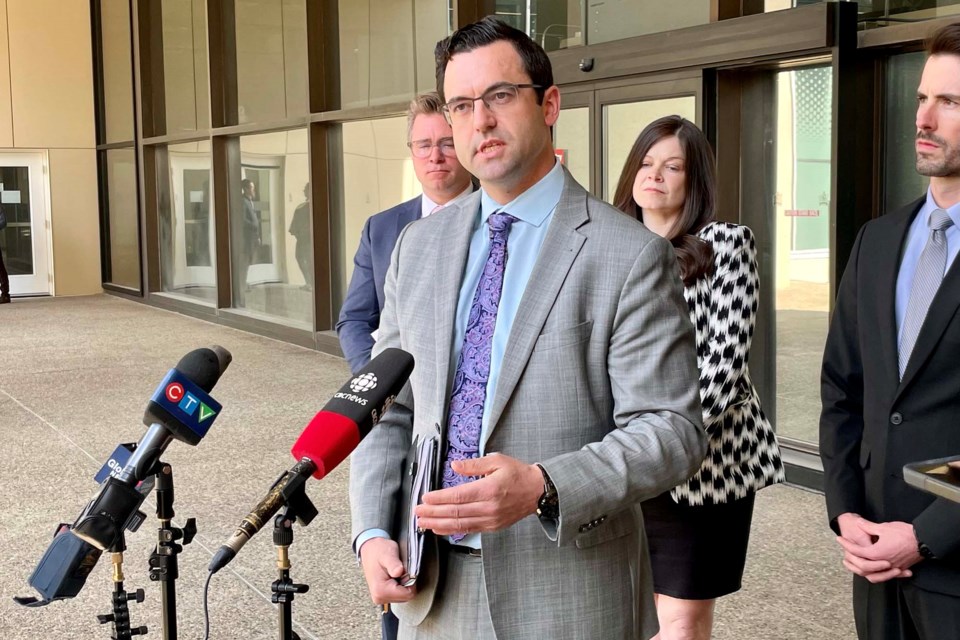Alberta's Crown prosecutors have avoided strike action after a deal was struck with the province to eventually allow them to collectively bargain.
President of the Alberta Crown Attorneys' Association Dallas Sopko said on Monday afternoon the group had met with the provincial government, who told them they would work to set out guidelines for the prosecutors to set up collective bargaining agreements.
“What is most promising for us is that the government now understands where we're coming from and a number of barriers [to] communication have now been removed,” Sopko said.
Previously, the Alberta Crown prosecutors didn’t have the ability to collectively bargain on their own, and would have needed to work under the Alberta Union of Provincial Employees (AUPE) banner, which Sopko said would create a conflict, as prosecutors need to be seen as independent.
Now the prosecutors will enter into six weeks of negotiations with the provincial government to eventually allow them to collectively bargain, so prosecutors can deal with the other pressing issues they face in their day-to-day jobs.
“The government has committed to resolving the long-term issues that have plagued our service by agreeing to enter negotiations towards a framework agreement,” Sopko said.
Once the collective agreement is in place, Sopko said they will focus on tackling the pressing issues of crushing workloads, non-competitive wages, and mental-health supports.
In the meantime, the province has committed to bringing prosecutor compensation more in line with the federal government, British Columbia, and Ontario through most seniority levels, and will be retroactive to April 1, 2020. Sopko said the province has committed to providing more mental-health supports, although the exact details haven’t been worked out yet.
“These commitments by the government will help to relieve some of the short-term issues plaguing our prosecution service. Our association appreciates these commitments by our government,” Sopko said.
In a press release the provincial government said it met with the Alberta Crown Attorneys' Association through April and recognized prosecutor pay was an issue. A comprehensive analysis of market rates across the country was completed and showed that prosecutor compensation was noticeably lower in Alberta.
As a result, Alberta’s Crown prosecutors will receive market adjustments to make their pay competitive with other provinces and the federal prosecution service, the release said.
“I want to extend my thanks to the Alberta Crown Attorneys’ Association for their advocacy on behalf of Alberta’s Crown prosecutors. Paying Alberta’s Crown prosecutors a market rate is critical to ensuring that we have the best and brightest on the job conducting criminal prosecutions on behalf of Albertans, said Alberta's Minister of Justice and Solicitor General Tyler Shandro.
Prosecutor retention is a priority for Sopko and the rest of the association, as they have had trouble keeping senior staff due to large file loads and non-competitive wages.
In some areas of the province, such as St. Paul, prosecutors are responsible for 400 files at once, a number Sopko said in April is too high.
When vacancies exist and can’t be filled, files start piling up on the prosecutors who are on staff. Prosecutors must take these files and get them to trial within a time frame laid out by a Supreme Court decision, which dictates a provincial court file must be heard 18 months after charges are laid, or 30 months for cases that require a preliminary inquiry. If cases aren’t heard, they will be stayed by the court, which means there will be no verdict or punishment in the case.
And serious cases are at risk of running over this, known as the Jordan ruling, Sopko said previously, adding 3,000 files are at risk of hitting the allotted time limit to see justice, and 2,000 of them are serious or violent offences.
Prosecutors are dealing with a lot of serious cases in Alberta overall, with more than 220 active homicide files.
With big case loads and serious cases coming forward, Sopko said the mental health of prosecutors is wearing thin. In a survey the association ran in the fall some 95 per cent of respondents said they were feeling burned out in the workplace.
A fall survey reported that 86 per cent of prosecutors who responded said they sometimes go to court under-prepared, and 84 per cent said they think the result of cases would be different if they had more time to prepare.
Other provinces have been attracting candidates because of compensation, too, said the association president.
The Alberta Crown’s offices will train lawyers for years but lose them to other provinces, or they will graduate from Alberta’s two law schools and then immediately move to jurisdictions where the compensation is higher, Sopko said.
In British Columbia and Ontario, Sopko said, through a prosecutor's career, they will make “substantially more each year.” Alberta also doesn’t have parental leave benefits other jurisdictions have.
The association will spend the next six weeks negotiating with the province to build a framework to allow them to collectively bargain and Sopko said members are "cautiously optimistic."
"Our members understand, and our executive understand that what has happened in the last month is groundbreaking. The government has acknowledged these shortcomings and is going to work with us. So what I would say is we are motivated and we're cautiously optimistic that within the next six weeks or so, there will be substantive change that will be in the best interest [of everybody]," Sopko said.
But if negotiations don't go well and the two sides hit an impasse, Sopko said a strike could be back on the table, if it is the only way for prosecutors to ensure the long-term viability of their services.




